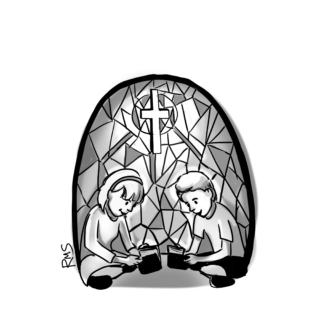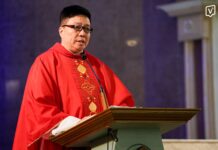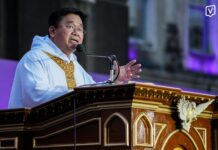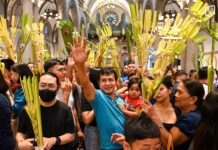THE SYNOD Fathers of the recently concluded Synod on Youth stressed the irreplaceable role of Catholic academic institutions in evangelizing the youth.
For Bishop Leopoldo Jaucian, one of the Philippines’s delegates to the synod, Catholic schools should guide them in discerning their vocation through “speaking the language of the youth.”
“We should not water down the doctrines [but] the Church should speak in the language that the youth will understand. [This is] more on the presentation, how do we present them, package them, in a way that they will really enjoy,” he said.
Jaucian, who is also the chairman of the Episcopal Commission on Youth (ECY), said Catholic institutions should not just provide information but use education to promote respect for human life.
“It should be an education of love for life, not for profit or to form students just to earn profit, but a real formation of the whole person, integral formation of the whole person according to the will of God,” he told the Varsitarian.
Recalling his synod experience, Jaucian said he encountered youth who have stood by their faith amid persecutions and violence such as bomb attacks.
“They hold on to their faith. What they need are not mere teachers but witnesses. Life witnessing is powerful than just mere telling them about teachings and doctrine,” he said.
Echoing Jaucian, UST Secretary General Fr. Jesus Miranda Jr., O.P. said the best way of teaching is through living as an example to the youth.
“No amount of instruction, no amount of orientation [will surpass being an example]. That’s why when you want [to attract] people, there’s no amount of teaching that can really convert people. It’s how you live your life that should be seen,” he said.
Miranda said the University strives to evangelize the Thomasian community through education.
“You are being evangelized in the context of your fields like sciences and [others] where you see your calling. You should always be imbued with these evangelizing values,” he said in an interview.
For instance, he cited the University’s recent move to revise the curriculum of the Institute of Religion to embed Thomistic philosophy and theology in its courses.
Starting this academic year, the Institute moved two subjects, with three units each, to the UST Senior High School and added a new three-unit course to the college curriculum.
Allan Basas, a professor from the Institute of Religion, said the new curriculum integrated faith and context in the light of the Gospel.
The new theology courses also included community development activities in partnership with the Center for Campus Ministry and UST-Simbahayan, during recollections in the first and second years.
Youth channels mission of the Church
Fr. Jeffrey Aytona, O.P., national adviser of the Dominican Network (Domnet) Youth Group, said the Church must be in dialogue with young people to know their personal needs and concerns.
“Dialogue happens when youth ministers journey with the young. Of course, we recognize the help that modern communication and technology can do, but nothing can replace a personalized interaction with them,” he said.
Youth groups “channel the energy of the youth for life and mission of the Church,” Aytona added.
Religious youth organizations in the University echoed this, stressing that doctrines should be taught in an interesting manner like through music, youth camps, conferences and outreach programs.
For Xavier Macader, UST Youth For Christ president, personalized interaction is an effective strategy for the Church to listen to the youth’s concerns and experiences.
“We are living in a generation where everything is available and accessible, which is why we are prone to distractions and temptations. They should be one with the youth. Hear their concerns, their pains, their struggles,” he said.
Clarisse Enriquez of UST Campus Feast emphasized that the Church should use faith to guide the youth in discovering and understanding themselves.
The Synod, with the theme “Young People, the Faith and Vocational Discernment,” was held last Oct. 3 to 28 at the Vatican to aid the Church in accompanying young people to discover their vocation.
The other Filipino delegates were Manila Archbishop Luis Antonio Cardinal Tagle, Bacolod Bishop Patricio Buzon, Legazpi Bishop Joel Baylon, Fr. Renato de Guzman of the Don Bosco Educational Center, Fr. Emmanuel Enrico Ayo of the Diocese of Parañaque, Solomon Islands Bishop Pedro Baquero and youth representative Nicole Anne Perez from the Archdiocese of Manila.
The Catholic Church in the Philippines has declared 2019 as the Year of the Youth, as part of the nine-year preparation for the 500th anniversary of the arrival of Christianity in the country in 2021. with reports from M. C. Serquina














